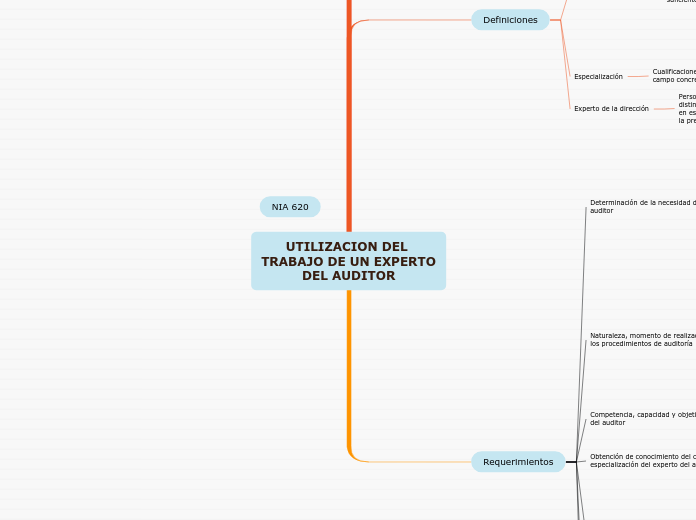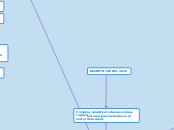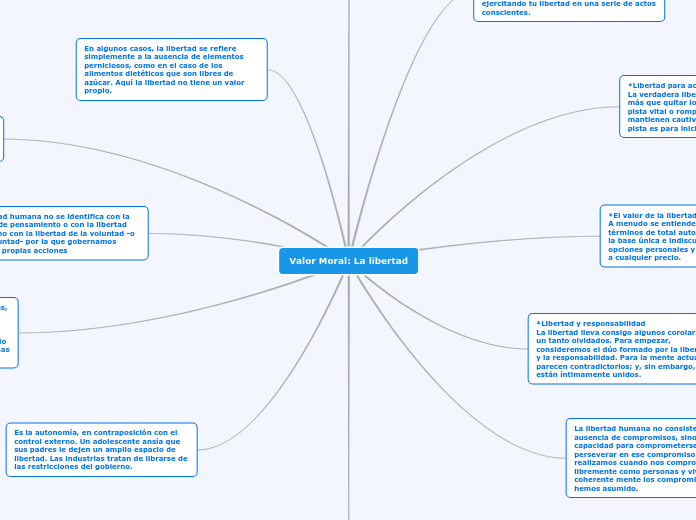Fecha de entrada en vigor
15/12/2009
NIA 620
UTILIZACION DEL TRABAJO DE UN EXPERTO DEL AUDITOR
To name your story, you have to think about the overall message and what you want your audience to understand from the story. Also, make it relevant and easy to remember.
Requerimientos
Referencia al experto del auditor en el informe de auditoría
En el informe de auditoría que contenga una opinión no modificada, el auditor no hará referencia al trabajo del experto del auditor
Evaluación de la adecuación del trabajo del experto del auditor
Si implica la utilización de datos fuente, significativos de ese trabajo la relevancia, integridad y exactitud de dichos datos fuente
Si el trabajo del experto implica la utilización de hipótesis y de métodos significativos
La relevancia y razonabilidad de los hallazgos y conclusiones del experto
Procedimientos corroborativos
Re-ejecución de cálculos
Aplicación de procedimientos analíticos detallados
Confirmación de cuestiones relevantes con terceros
Examen de datos publicados
Revisión de los papeles de trabajo e informes del experto auditor
Indagaciones ante el experto auditor
Acuerdo con experto del auditor
El auditor acordará
La naturaleza y momento de realización y la extension de la comunicacion entre el auditor y el experto
Las funciones y responsabilidades del auditor y del experto
La naturaleza, el alcance y los objetivos de trabajo del experto
Obtención de conocimiento del campo de especialización del experto del auditor
El auditor obtendrá suficiente conocimiento del campo de especialización del experto del auditor que le permita
Evaluar la adecuación de dicho trabajo para los fines del auditor
Determinar la naturaleza, el alcance y los objetivos del trabajo del experto para los fines del auditor
Competencia, capacidad y objetividad del experto del auditor
El auditor evaluará si el experto del auditor tienen la competencia, la capacidad la objetividad necesaria para los fines del auditor.
Naturaleza, momento de realización y extensión de los procedimientos de auditoría
Si dicho experto esta sujeto a procedimientos de control de la firma de auditoría
El conocimiento de la experiencia del trabajo relacionado con anterioridad por dicho experto
La significatividad del trabajo de dicho experto en el contexto de la auditoría
Los riesgos de incorrección material en la cuestión con la que se relaciona el trabajo de dicho experto
La naturaleza de la cuestión con la que esta relacionado el trabajo de dicho experto
E
Determinación de la necesidad de un experto del auditor
Puede resultar necesario un experto del auditor para
La evaluación de la suficiencia y adecuación de la evidencia de auditoría obtenida
El diseño y la aplicación de procedimientos de auditoría posteriores para responder a riesgos valorados en las afirmaciones
La determinación e implementación de respuestas globales a los riesgos valorados en los estados financieros
La identificación y valoración de los riesgos de incorrección material
La obtención de conocimiento de la entidad y su entorno, incluido el control interno
Definiciones
The ending of a story is essential. We all know that if the ending is weak, what happened before loses its importance. So make it unpredictable, but fair. A resolved ending answers all the questions and ties up any loose threads from the plot.
Experto de la dirección
Persona u organización especializada en un campo distinto al de la contabilidad o auditoría, cuyo trabajo en es e campo se utiliza por la entidad para facilitar la preparación de los estados financieros
Especialización
This is the closure section of the story.
See examples of possible outcomes below:
- all problems have been solved
- it's clear how each one of your characters ends up
- your main character is transformed by the challenge
Cualificaciones, conocimiento y experiencia en un campo concreto
Try answering these questions to come up with a closure:
- Have all the problems been solved?
- Is there a clear picture of what happens with each character in the story?
- Has the challenge transformed your main character?
- How do the characters feel in the end?
Experto del auditor
This is the moment when the main character surpasses the last obstacle and finally faces their greatest challenge.
The climax usually follows one of these patterns:
- realization
- resolution
- choice
Type in your answer.
Persona u organización especializada en un campo distinto al de la contabilidad o auditoría, cuyo trabajo en el campo se utiliza por el auditor para facilitarse la obtención de auditoría suficiente y adecuada
La especialización puede consistir en materias,
El análisis de cuestiones fiscales complejas o inusuales
La interpretación de contratos y de las disposiciones legales y reglamentarias
La valoración de pasivos medioambientales y de los costes de saneamiento
La estimación de reservas de petróleo u gas
Cálculo actuarial de pasivos asociados a contratos de seguros o a planes de pensiones de empleados
La valoración de instrumentos financieros complejos
Puede ser interno o externo
Objetivos
The middle of the story is where you add layers of complications that will lead to the end. Reveal more about the character's journey. Did their personality go through changes? How did they overcome the challenges? And as you build up the story’s central conflict, make it more personal to that character. Also, from the middle act, you have to lead into the final act.
En caso de utilizar el trabajo de un experto del auditor, determinar si dicho trabajo es adecuado para los fines del auditor
Your character(s) need(s) motivation in order to solve the challenge(s).
Determinar si utiliza el trabajo de un experto del auditor; y
Each story has a main character and that character usually needs to solve a problem or challenge. The character's challenge is the one that creates tension throughout the story.
Alcance
In the beginning of the story (or the exposition), you will need to introduce the setting and characters. You might also want to introduce the main conflict. This part of the story is important because it gives the reader necessary background information and maybe even a first insight into a character’s personality.
La responsabilidad del auditor respecto de la opinión de auditoria
Es responsable de la opinión de auditoría expresada, y la utilización por el auditor del trabajo de un experto del auditor no reduce dicha responsabilidad
No obstante, si concluye que el trabajo de dicho experto es adecuado para los fines del auditor, puede aceptar los hallazgos o las conclusiones del experto en su campo de especialización como evidencia de auditoría adecuada
Trata de las responsabilidades que tiene el auditor respecto del trabajo de una persona u organización en un campo de especialización distinto al de la contabilidad o auditoría, cuando dicho trabajo se utiliza para facilitar al auditor la obtención de evidencia de auditoría suficiente y adecuada
Characters are essential to a good story. Usually, the protagonist(s) is/are the most affected by the plot. Introduce a character by focusing on their actions, interests, and occupation, as the physical appearance doesn't make a difference in most cases.









